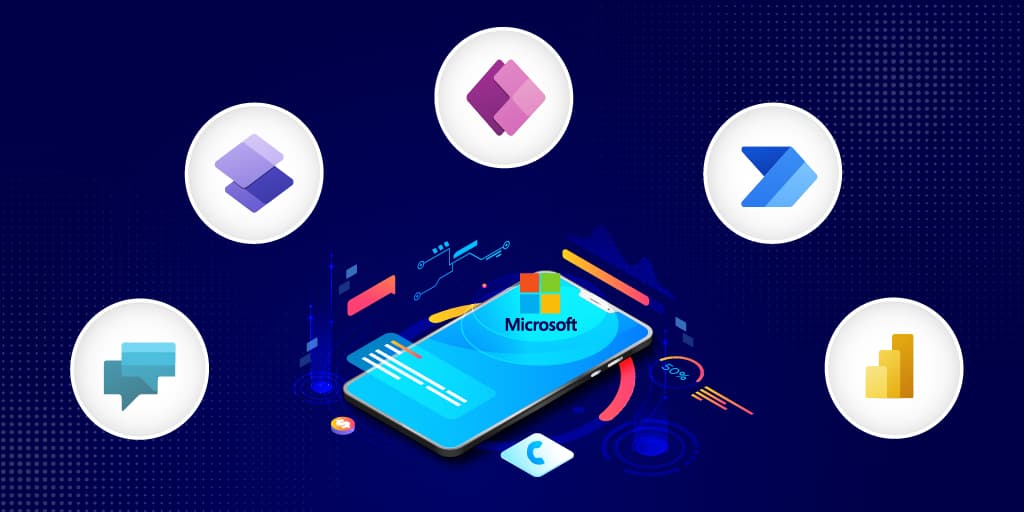
Handling High-Volume Data in Microsoft Fabric
Microsoft Fabric is an integrated analytics platform that simplifies data management, processing, and analysis, combining various Azure serv...

For businesses in the B2B space, the ability to quickly respond to market changes, streamline operations, and make data-driven decisions is more critical than ever. Since they operate in complex environments and rely heavily on digital tools to deliver services to clients, adopting innovative technologies that enable agility, and efficiency is key to staying ahead. One such technology that has proven its worth across industries is Microsoft Power Platform—a comprehensive, low-code solution designed to help businesses build custom apps, automate workflows, and gain actionable insights.
97% of Fortune 500 companies are using Power Platform, demonstrating its acceptance among leading enterprises. (Source: Microsoft)
In this blog, we’ll explore the applications and benefits of Power Platform for B2B product and service spaces, emphasizing how it can help businesses modernize their legacy systems, improve operational efficiency, and foster innovation. We’ll also highlight how Microsoft Fabric services complement Power Platform, offering businesses a unified, scalable data solution to support their digital transformation journey.
At its core, Microsoft Power Platform is a collection of low-code/no-code tools that empower users to create business solutions without the need for extensive coding knowledge.
Microsoft Power Platform comprises five main components

By integrating seamlessly with other Microsoft services like Office 365, Azure, and Dynamics 365, Power Platform enables businesses to create solutions that drive efficiency, improve productivity, and foster innovation.
According to Forrester, businesses utilizing Power Platform have seen up to 48% reductions in development costs, along with significant improvements in productivity.
Power Platform offers a suite of tools designed to streamline processes and boost productivity:
In a market where development costs are rising, Power Platform’s low-code/no-code approach presents an attractive alternative:
One of the most significant benefits of Power Platform is its versatility across industries:
A key differentiator for any B2B business is the ability to deliver exceptional customer experiences. Power Platform helps businesses achieve this by enabling personalized, data-driven customer interactions:
Many industries rely on outdated legacy systems that limit their ability to innovate. Power Platform offers a path to modernization:
Microsoft Power Platform has been successfully implemented by various industries to solve real-world challenges. Some notable names are:
Additionally, 70,000 new organizations have adopted Power Apps this year, reflecting the platform’s increasing popularity. (Microsoft)
The widespread adoption of Power Platform underscores its effectiveness in solving business challenges. When comparing to other low-code/no-code platforms like Mendix, OutSystems, Appian, and Pega, several unique advantages stand out:
As businesses continue to navigate digital transformation, Microsoft Power Platform provides the tools needed to build custom applications, automate workflows, and gain actionable insights, all while reducing costs and improving efficiency. When paired with Microsoft Fabric, businesses can unlock even more potential, creating a unified, scalable solution that drives long-term growth.
LevelShift offers expert consulting services in Microsoft Fabric and Power Platform, helping businesses modernize their legacy systems, streamline operations, and achieve digital transformation. By partnering with us, your business can harness the full power of these tools to stay competitive in today’s dynamic market.
Let’s explore how Microsoft Power Platform and Fabric can transform your business—contact us today to get started!

Microsoft Fabric promises what many enterprises have struggled to achieve for ye...

Why Real Time Intelligence is Crucial For a business leader evaluating real-time...

Whether you work in manufacturing, retail, logistics, healthcare, finance, Hi-Te...

Handling High-Volume Data in Microsoft Fabric
Microsoft Fabric is an integrated analytics platform that simplifies data management, processing, and analysis, combining various Azure serv...

Microsoft Ignite 2024 Insights: Key takeaways from LevelShift
LevelShift had the opportunity to attend Microsoft Ignite 2024, where the buzz around AI, data integration, and digital transformation was t...

Microsoft Fabric vs Databricks – Unified Simplicity vs Custom ML Powerhouse
Introduction As data platforms evolve, organizations are evaluating tools not just for analytics but for their full potential in AI, data en...